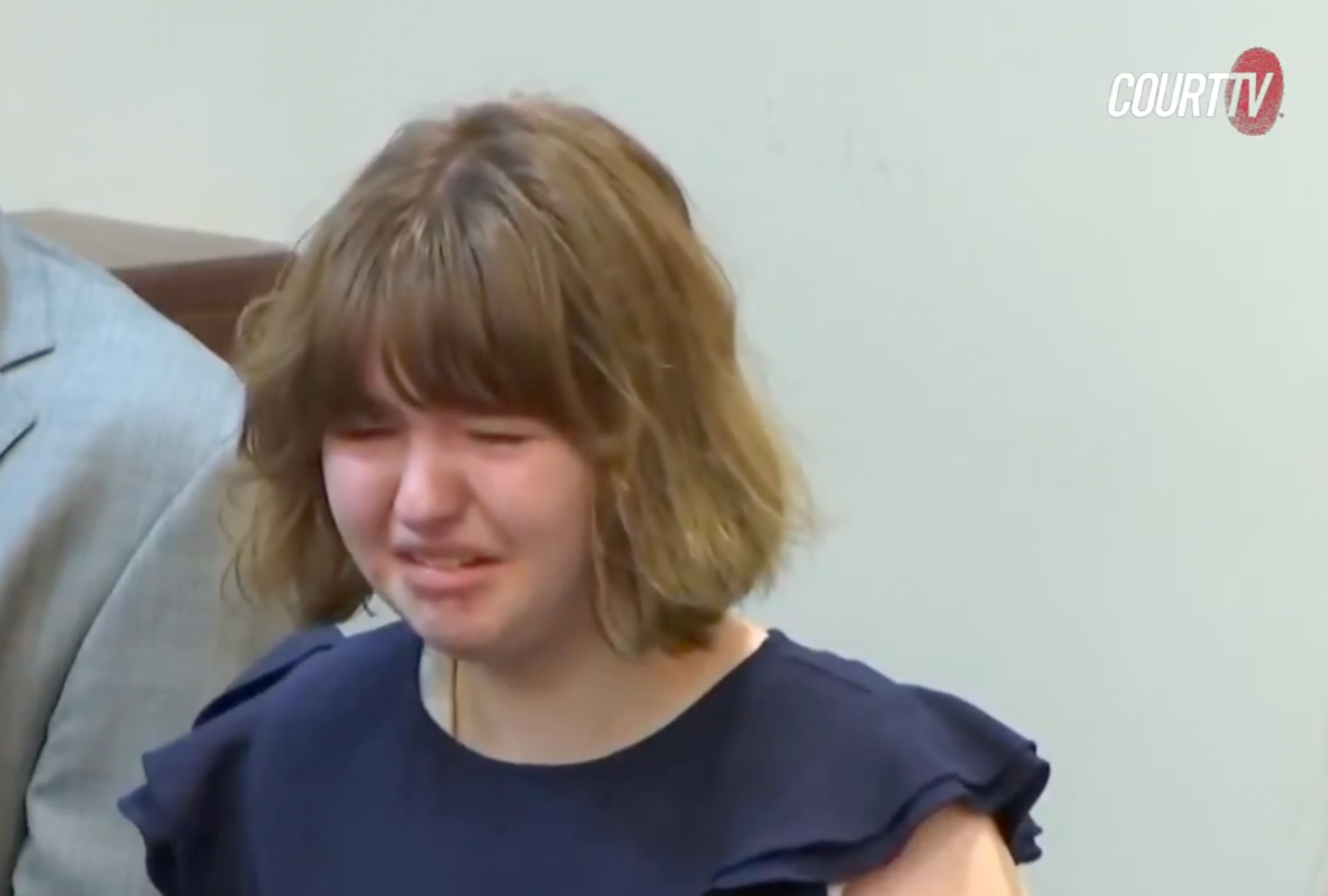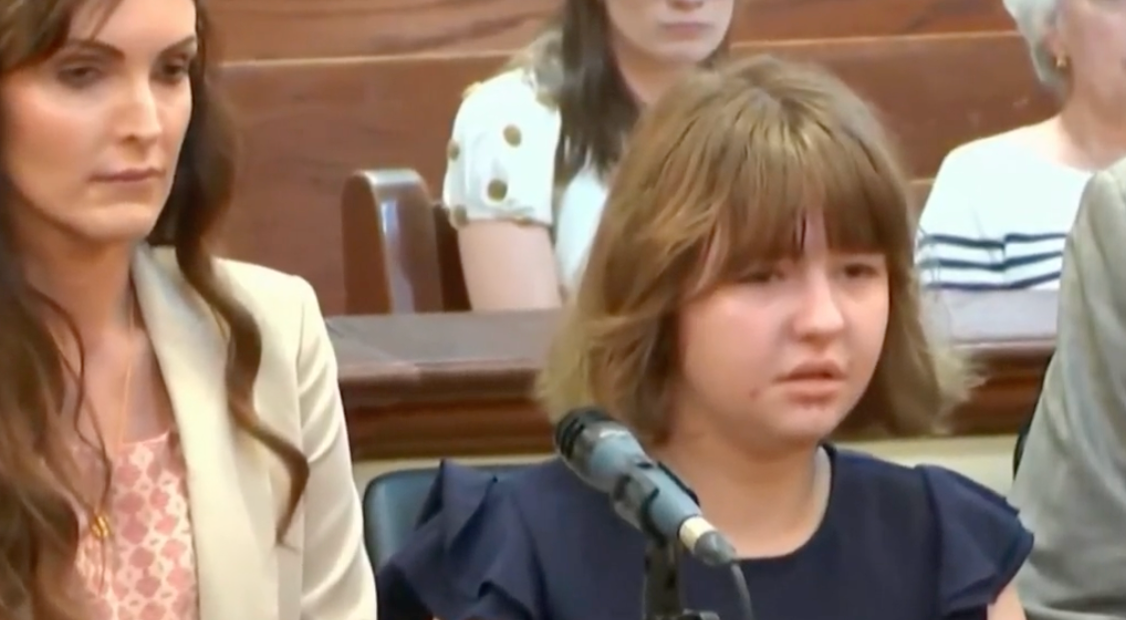This website uses cookies so that we can provide you with the best user experience possible. Cookie information is stored in your browser and performs functions such as recognising you when you return to our website and helping our team to understand which sections of the website you find most interesting and useful.
Your support helps us to tell the story
As your White House correspondent, I ask the tough questions and seek the answers that matter.
Your support enables me to be in the room, pressing for transparency and accountability. Without your contributions, we wouldn't have the resources to challenge those in power.
Your donation makes it possible for us to keep doing this important work, keeping you informed every step of the way to the November election

Andrew Feinberg
White House Correspondent
A 15-year-old girl has been sentenced to life in prison without parole after she murdered her mother and then invited a friend over to see the body.
Carly Madison Gregg was sentenced on Friday in Rankin County, Mississippi for the fatal shooting of her mom, Ashley Smylie, the attempted murder of her stepfather, and tampering with evidence.
In March, Gregg entered her mother’s bedroom and shot her, then texted her stepfather, Heath Smylie, to come home. When he arrived, she shot him, grazing his shoulder.

The jury deliberated for two hours over the verdict and for a third hour over sentencing. Prosecutor Kathryn Newman argued the sentence was appropriate because Gregg has shown “zero remorse.”
“She knew what she did,” Newman said in court, according to the Mississippi Clarion Ledger.
The life sentence will run concurrently with a 10-year sentence for evidence tampering.
Gregg previously turned down a plea deal offer to serve 40 years behind bars.
The teen broken down in tears with the verdict and sentence was read. Family members in the courtroom reportedly offered words of encouragement.
Defense attorney Kevin Camp told jurors that a life sentence would “make this worse on the family”. He argued at trial that the shooting occured when Gregg was 14 and in the midst of a mental health crisis.
Gregg plans to appeal, WAPT reports.

"Long week, sad day. Carly Gregg is evil. That’s not easy to say, but the truth of the matter is sometimes evil comes in young packages, small packages — and this is one of those cases," Bubba Bramlett, district attorney for Rankin and Madison counties, said after the verdict.
"She’s fixing to go to prison for the rest of her life. You hate that; she’s 15 years old, but that’s exactly where she belongs."
During the trial, Gregg’s stepfather described her as a “sweet little girl”, and described returning home to find her in an apparent state of mental distress.
“She was screaming out of her mind scared," Heath Smylie said. "It was like she had seen a demon or something, and my first thought was, there was an intruder somewhere, and she thought she was after somebody else."
Smylie told the court he and his stepdaughter talk nearly every day.
“I think we’re good. We talk just about every day now. I don’t always get off work in time to catch her on a phone call, but we text some back and forth over the app that’s allowed, and we talk over the video chat thing that’s allowed through the jail on weekends,” he said. “We’re good.”
He said he believed the teen didn’t recognize him during the shooting.
“I still to this day don’t even think she recognized me,” he said. “Something was off.”
Jurors saw surveillance video of Gregg with a gun behind her back walking into her mother’s bedroom, where the sound of shots and screams could be heard. The teen hid the footage after the shooting, according to prosecutors.
After the shooting, Gregg invited a friend over to see the body. “Are you squeamish around dead bodies?” the friend, identified in court documents as B.W. due to their minor status, remembers Gregg asking.
The shooting occured after a friend had told Gregg’s parents that she was using marijuana.
Much of the trial revolved around assessing the teen’s mental state at the time of the shooting, and her attorneys argued an insanity defense.
Dr. Andrew Clark, a child psychologist, testified that Gregg had long suffered with depression and anxiety, and had a worsened mental state after her sister died when she was four. Gregg appeared to have symptoms consistent with post-traumatic stress disorder and had previously engaged in self-harm, Dr Clark said.
He read jurors a March 12 journal entry, a week before the shooting, where the teen described having what she said was a “psychotic break” where she “actually spoke with one of the voices in my head.”
Witnesses for the prosecution testified that Gregg was competent to stand trial, and hadn’t indicated hearing voices in mental health check-ups as recently as January 2024.
Forensic psychiatrist Dr. Jason Pickett said that Gregg didn’t meet the legal standard of insanity, and cited a February text message where Gregg told a friend: “You don’t understand how (expletive) psycho I was that day, I almost murdered my parents.”
Pickett said: “My opinion is that Carly does not meet Mississippi’s standard for insanity at the time of the offense and that she knew the nature, quality and wrongfulness of her actions during that day.”



 Africana55 Radio
Africana55 Radio 
